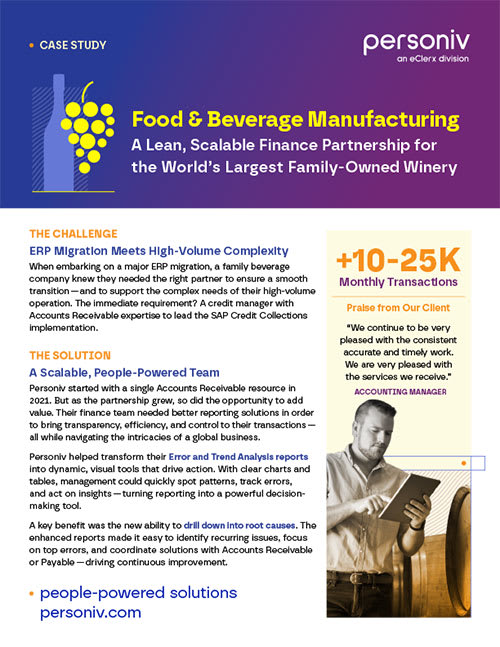
In this special episode of CFO Weekly, we turn the tables as Jack McCullough, Founder and President of the CFO Leadership Council, interviews Megan Weis about Personiv's 2025 CFO Pulse Report. Megan brings extensive experience in finance and accounting outsourcing, having started her career as a CPA at Deloitte & Touche before transitioning through roles at BP, Accenture, and Everest Group. She earned her MBA from Duke University and joined Personiv in 2017 to help launch their finance and accounting services division. With her deep background in the evolution of finance operations and talent management, Megan shares insights from the comprehensive survey of 253 finance and accounting leaders across more than 20 industries. Currently serving as a key leader at Personiv, Megan oversees the development of strategic insights that help CFOs navigate the most significant talent shortage in the profession's history while adapting to technological transformation, and shares key finance outsourcing strategies as well.
Show/Hide Transcript
Megan - 00:02: Today, we have a special episode with Jack McCullough. Jack is the founder and president of the CFO Leadership Council, a professional association with over 2,500 members across the globe. He also chairs the MIT Sloan CFO Summit, widely recognized as one of the most influential gatherings of financial and strategic leaders in the world. Jack held senior financial and strategic roles at leading technology firms and worked as a consultant to venture-backed startups and Fortune 500 companies alike. As the host of the "Secrets of a Rockstar CFOs" podcast, Jack has interviewed more than 100 top financial executives from across industries, distilling lessons in leadership, influence, and resilience that transcend the finance function. He is also a senior contributor to Forbes, where he is the most-read author on the CFO network and a trusted voice on executive performance and organizational dynamics. Jack is also the author of four books: "The Rodman Paradox," his latest work exploring how organizations depend on unconventional, irreplaceable talent; "Secrets of a Rockstar CFOs," a behind-the-scenes look at how the best financial leaders operate; "MBA for Lunch," a concise conversational crash course in the core business disciplines; and "The Psychopath CEO," an executive survival guide, a bold exposé of toxic leadership at the top.
Jack - 00:02:11: Hi, everyone, and welcome to CFO Weekly. As you've probably figured out, I'm not Megan. My name is Jack McCullough, and I'm the President of the CFO Leadership Council, a longtime partner of Personiv, and I'm also a friend of Megan's. Personiv recently published the 2024 CFO Pulse Report, which has become an invaluable tool for CFOs and others. Our members love it. So we decided today we're gonna turn the tables on Megan to discuss the report. Megan, welcome to CFO Weekly.
Megan - 00:02:40: Thank you. And I'm looking forward to being on this side of the table.
Jack - 00:02:44: Yeah. A little different. So before we get into the data, and it's absolutely fascinating, I'd like to understand a little about your role with Personiv and maybe give the 10,000-foot review of what Personiv does.
Megan - 00:02:56: Sure. So I started my career very traditionally, but it quickly became a windy path, which is actually one of the things I love about accounting. There are just so many different directions that a career can take. I earned my undergraduate degree in accounting from Kent State University. I passed the CPA exam, and I joined Deloitte and Touche right out of college. And after surviving a few busy seasons as an auditor, I was thankful for the experience but determined that this path was not for me. And at this point, I moved into a financial analyst role at BP and eventually joined Accenture in 2002-2003. And this was right around the time that outsourcing was really beginning to take off. And that's where I was first introduced to finance and accounting outsourcing, and it really sparked something for me. Over the next 12 years, I gained hands-on experience designing, transitioning, and managing large complex engagements. And although it was incredibly valuable, at some point I realized I wanted to have a more direct impact, which is what led me to pursue an MBA in global business from Duke University with the intention of changing my path. After finishing that program in 2015, I joined a company here in Dallas called Everest Group as an analyst focused on the future of finance and accounting, and this gave me a chance to work closely with leading F&A outsourcing providers from a different angle and explore how the profession was evolving. During my time there, we actually partnered with Personiv on one of their strategic initiatives to expand their service offerings, and one of our recommendations at that point was to move into F&A. So when they decided to make the leap in 2017, I came on board to help bring that vision to life. My role at Personiv really feels to me like the culmination of everything I've done so far. We're a global BPO provider that specializes in finance and accounting services, offering flexible offshore teams based in the Philippines and India, but fully aligned with US time zones and standards. And I'm passionate about the work we do and energized by the opportunity to help clients solve their most pressing talent challenges, which actually ties in perfectly with today's discussion.
Jack - 00:05:05: Fantastic. So I didn't actually know all that about you. I've only known you since Personiv. So yeah, great background. Just kind of curious, when were you at Duke?
Megan - 00:05:11: I started in 2014 and finished in 2015.
Jack - 00:05:14: I didn't speak to you, mister, by a couple of years. So yeah.
Megan - 00:05:16: It was an executive program, and it was an amazing experience that I'm very thankful for.
Jack - 00:05:21: Yeah. I can imagine Duke is such a world-class institute. Fantastic. So a little bit about the CFO Pulse Report. So can you walk us through, you know, the motivation for launching it and the methodology behind it and what you're hoping to uncover with this year's survey?
Megan - 00:05:36: Absolutely. So the idea behind launching the CFO Pulse Report really came from a desire to stay closely connected to the real day-to-day challenges that finance and accounting leaders are facing, especially around talent. Through hosting CFO Weekly, I've had so many conversations with CFOs who say the same thing. Finding skilled accounting professionals is incredibly tough and it's not getting any easier. So we thought why not put data behind what we were consistently hearing? This year's report continues that mission. We wanted to go deeper into how the talent landscape is shifting and what CFOs are doing in response. In February, we surveyed 253 finance and accounting leaders across more than 20 industries to get a broad cross-sector view. And what really stood out this year is that while the talent shortage is still very real, there are signs of change. More leaders are recognizing what today's workforce actually values, things like flexibility, meaningful career growth, and better work-life balance. And encouragingly, and as a side note, we're also starting to see a slight uptick in university accounting program enrollment. Another big shift is technology. Obviously, CFOs are leaning into things like automation, AI, and outsourcing, and not just as temporary fixes, but as core strategies to build more adaptable, resilient teams. So what's really exciting is that we're seeing a shift from awareness to action. The data tells the story of a profession that's evolving and of finance leaders who are stepping up to lead that evolution.
Jack - 00:07:12: That's great. So, you know, we've been hearing, all of us in the profession, we've been hearing about the talent shortage, but it's felt almost euphemistic to us because, you know, there's no data behind it, just sort of a general sense. So finally, you put some numbers to it and they are attention-grabbing, to say the least, Megan. So it highlights 150%. That was one of those, "Is that a typo?" type of number. Year-over-year increase in open finance and accounting roles and 87% of finance leaders acknowledging a worsening talent shortage. So what have you learned that are the underlying factors contributing to the significant talent gap? And how are CFOs gonna adapt their strategies to adjust these challenges because they're formidable?
Megan - 00:07:53: The accounting talent gap didn't emerge overnight. It's been on our radar for, I would say, at least the last decade now as a problem. And it's really the result of a perfect storm, a wave of retirements, declining enrollment in accounting programs, evolving skill requirements, and a perception problem that paints the profession as rigid and outdated. At the same time, younger generations are seeking flexibility, purpose, and modern tools, and these are all things that aren't traditionally known in the accounting profession. So CFOs are stepping up by rethinking how they build and retain their teams. They're investing in upskilling and reskilling. They're training their professionals in automation, data analytics, and business partnering, while also redesigning career paths to offer faster growth, broader exposure, and more meaningful work. There's also a big push to rebrand the finance function itself. Instead of being seen as back-office compliance, today's accounting teams are positioned as strategic enablers of growth, leveraging technology, supporting decision-making, and driving performance. And to scale effectively, many CFOs are also turning to global talent pools, offshoring transactional work to high-quality partners in regions like the Philippines and India. And at the same time, they're partnering with universities and even high schools these days to rebuild the talent pipeline early on. And finally, culture matters more than ever. Flexibility, mental health, inclusion, and purpose-driven leadership are now essential to attracting and keeping top talent. In short, today's finance leaders aren't just trying to fill open roles. They're transforming what it means to build a modern, resilient, and future-ready accounting team.
Jack - 00:09:41: That's fantastic. And I mentioned you can't escape talk of talent shortages, but, you know, you can't escape talk about AI and automation in our profession too. We're seeing AI automation and outsourcing emerge. These are the go-to solutions for CFOs these days. But can you share how finance leaders are integrating these technologies into their operations and the impact that they're having on team efficiency and scalability?
Megan - 00:10:05: Sure. And this is really interesting. So AI automation and outsourcing have become core strategies for finance leaders navigating not only things like the talent shortage, but also rising costs and the need for real-time insights. They're not just efficiency tools these days. They're actually reshaping how finance operates and adds value. So let's start with AI and automation. These tools are streamlining high-volume tasks like invoice processing, reconciliations, and forecasting. This has led to faster close cycles, fewer errors, and a 30 to 50% reduction in manual work. And this, more importantly, frees up teams to focus more on strategic analysis and business partnering. And outsourcing these days is equally critical. CFOs are leveraging global delivery models, whether through third-party outsourcers or internal shared service centers, to handle things like GL, AP and AR, payroll, and more. Hybrid teams across time zones, they can enable 24/7 coverage. They deliver cost savings of up to 60%, and they provide access to specialized talent. That's really hard to find here or if you can't find it, it's very expensive. But the real value comes when these strategies are integrated. Let's take accounts payable as an example. AI automates data capture while an offshore team offers quicker processing that can help capture vendor discounts and optimize working capital. The result is faster turnaround, lower cost, and better scalability. At a strategic level, this integrated approach boosts agility, resilience, and engagement because finance teams are spending less time on data entry and more time driving insights, which is really what we all want to be doing as accounts. In short, today's top CFOs aren't picking just one lever. They're combining AI, automation, and outsourcing to transform finance into a smarter, faster, and more strategic function.
Jack - 00:12:12: That's amazing and fantastic. So I want to get back to the talent shortage issue, which we led off with. And CFOs have to be reevaluating their workforce planning. So how are they thinking or rethinking, organizational structure and talent pipelines to build more resilient and more agile teams in this environment?
Megan - 00:12:33: Yeah. So the persistent talent shortage in accounting and finance has really forced CFOs to take a step back and to reimagine how their teams are built and how the function operates overall. It's no longer just about filling open roles. It's about creating a more resilient, scalable, and future-ready finance ecosystem, and that's showing up in four big ways. First, there's a shift in how teams are structured. We're seeing a move away from rigid hierarchies towards a more flexible distributed model. Many finance functions now blend onshore, nearshore, and offshore talent, which enables 24/7 coverage and greater cost efficiencies. Hub and spoke models are becoming more common where strategic work stays close to the business and transactional tasks are centralized or outsourced. And some organizations are even building agile pods around specific business units or transformation goals, bringing together areas like finance, analytics, and automation to drive faster and smarter decisions. Second, companies are rethinking the talent pipeline. The traditional CPA track just isn't enough anymore. There's growing demand for people with backgrounds in data science, operations, and analytics. CFOs are tapping into global talent pools, particularly in the Philippines, India, and Eastern Europe, and bringing in contingent talent for project-based needs. At the same time, they're investing in early talent programs and internal finance academies to build the next generation of skilled, tech-savvy finance professionals. Third is the integration of people and technology, which is front and center. Automation and AI are being used to handle repetitive tasks like reconciliation and data entry, freeing up teams to focus on higher value work. And we're seeing the emergence of new hybrid roles like digital controllers or finance automation leads that sit at the intersection of finance and tech. It's about designing roles where human expertise and digital tools work hand in hand to drive better outcomes. And finally, retention is now just as critical as recruitment, or maybe it always has been, but now it's really front and center. Companies are redesigning the employee experience to support growth and flexibility. That means flatter org structures, faster promotion paths, rotational programs, and a strong emphasis on flexibility, DEI, and purpose. These things are no longer just nice to haves. They're essential to keeping top talent engaged in a competitive market. So the bottom line is that CFOs are no longer just managing headcount. They're building agile, tech-enabled, talent-focused finance organizations that are better equipped to navigate today's challenges and tomorrow's opportunities. It's not just about weathering the talent shortage. It's about coming out of it stronger.
Jack - 00:15:39: That's great. And it's fascinating to me because for a while now, roles have been taking longer and longer to fill. And, anecdotally, I sense that it's never been harder, and your report proves my hunch. In fact, you report that it's taking up to 120 days and longer to fill certain roles, which is crazy. To me, this has two impacts. The first, it impacts business continuity and also impacts team morale. So what are the effective ways CFOs are using to deal with those two things?
Megan - 00:16:07: Yeah. So this is a challenge that we're seeing across the industry, and the impact of these prolonged hiring timelines goes well beyond a delayed start date. When these finance roles stay open for 90 to 120 days and, like you mentioned, even longer sometimes, it affects business continuity, team morale, and strategic momentum. So first, there's the operational risk. Understaffed teams often struggle to close books on time, deliver accurate reports, or stay ahead of compliance deadlines. The result is often errors, fire drills, and reactive firefighting that slows the business down, and we've all been there. And the second is the toll that takes on people. So when these roles aren't backfilled quickly, the extra workload inevitably falls on existing staff, leading to burnout, frustration, and eventually attrition. And this not only affects morale, but can also trigger a domino effect of turnover. And third, it delays strategic progress. Finance transformation projects like automation, ERP upgrades, or cost initiatives often get sidelined when bandwidth is stretched, leaving the function stuck permanently in maintenance mode. So how are CFOs responding? As I've mentioned, in the short term, they're using things like interim talent, they're redistributing the work, and they're cross-training staff to maintain coverage. But longer term, they're rethinking their approach to workforce planning. They're doing things like building internal benches through rotation and development programs. They're expanding the talent pool by tapping into offshore talent, outsourcing, and being more flexible on hiring criteria. They're streamlining the hiring process with AI tools and pre-vetted pipelines to speed things up. And most importantly, they're doubling down on retention through things like flexible work, career growth, and stronger employee engagement. So the goal isn't just to fill seats these days. As I've mentioned, it's really to create a more resilient and adaptable finance function that can keep delivering even in the face of talent shortages, which, as we've mentioned, are not going away anytime soon.
Jack - 00:18:25: It's reality. But you did have one positive thing that's coming out of this in the report. I noticed that there's recently been a 12% increase in undergraduate accounting enrollments. Yeah. Which has surprised me, I have to admit, but very promising. So how are companies planning for this future talent? And it's great, but it doesn't exactly help the immediate needs either.
Megan - 00:18:46: That's a great question and one that I'm genuinely passionate about because I think back, like, five or 10 years ago when there was a real concern that automation and AI might eliminate the need for accountants altogether. But what we've seen is the opposite. The demand for accounting professionals has grown and not diminished. But what's really changed is the nature of the role. And companies aren't just waiting for the next wave of accounting grads to show up. They're being intentional about how they attract, develop, and deploy talent to align with where the profession is heading. So today's accountants aren't just closing books. They're expected to be strategic partners who can analyze data, support business decisions, and work cross-functionally. And that shift is changing both the skill sets companies look for and how roles are designed. There's also a strong push toward tech fluency. With automation and AI transforming transactional work, future accountants need to be comfortable with tools like Power BI and RPA, and they need to be able to act as a bridge between finance and IT. And at the same time, teams are becoming more agile and global with distributed models and flexible structures that support collaboration across time zones and business priorities. And we're also seeing accounting rules expand into areas like ESG, compliance, and risk, where accuracy, transparency, and strategic thinking are critical. In fact, I've heard the CFO's role referred to as the "Chief Everything Officer" these days. So to widen the pipeline, companies are recruiting from adjacent fields, they're investing in upskilling, and they're using outsourcing to fill specialized gaps. They're doubling down on soft skills like adaptability, communication, and leadership. These soft skills are increasingly becoming essential for today and tomorrow's accountants. So in short, companies are solving for today's gaps while building for a more strategic, tech-enabled, and globally minded accounting function, and one that's turning more valuable than ever.
Jack - 00:21:02: That's fantastic. And what was the phrase you used? "Chief Everything Officer." Yeah. Wow. It's pretty good. You know, I've made some of the same observations myself. I'd never heard that particular phrase. But the CFO role, other than maybe the chief human resources officer, it's probably the most cross-functional company these days. So I really like that, and I'll be stealing that from you on a podcast, Megan. So
Megan - 00:21:23: Feel free.
Jack - 00:21:23: It's actually a good segue. Since you've been interviewing CFOs, your podcast is now about five years old?
Megan - 00:21:30: Just over five years.
Jack - 00:21:31: Well, belated happy anniversary then, Megan.
Megan - 00:21:33: Thank you.
Jack - 00:21:33: So but you've had sort of a front-row seat to how the CFO role has evolved during some amazing times to be a leader in corporate America. But how have you seen it evolve during that time?
Megan - 00:21:45: Yeah. This is a great question because the CFO role has evolved dramatically in just the last five years. It's no longer just about financial stewardship. Today's CFO is a strategic, technological, and cultural leader. And here are the key shifts I've seen. Strategic partner. CFOs are now co-pilots to the CEO, helping shape long-term strategy, lead digital transformation, and guide capital allocation. Moving beyond just tracking past performance to actively steering future growth. Technology and data leaders, they're driving automation, AI adoption, and ERP modernization. They're using advanced analytics to deliver insights and partnering closely with tech leaders on enterprise data strategies. Risk and resilience champion. From financial risk to cyber threats and supply chain disruption, CFOs are at the center of resilient planning and business continuity. They're people and culture builders. With talent shortages and hybrid work, CFOs are shaping workforce strategies, supporting DEI, and creating learning-focused collaborative cultures. And last but definitely not least, "Communicator in Chief." And this is a term I hear over and over again, but today's CFOs must be a compelling storyteller. They must be able to translate complex financials into clear strategic narratives for boards, investors, and teams. So in short, the modern CFO is a forward-looking, tech-savvy, people-centric executive central to driving growth, resilience, and value creation.
Jack - 00:23:32: Well, that is very well said. You gave me a lot of material to plagiarize, and I won't eat it. I'm not above that sort of thing. But one thing I wanted to, you know, follow up, you mentioned being the co-pilot to the CEO. And one thing I've observed, CFOs for the last few years have shared that CEO is their most important strategic partnership. And it wasn't necessarily reciprocated all the time. A lot of times, CEOs would say maybe it's the VP of sales or the head of engineering or whatever it might be. But I'm seeing more and more that CEOs are actually reciprocating for the first time in large numbers. And have you observed anything similar to that, that CEOs are saying, yes. This is my most trusted?
Megan - 00:24:13: Actually, I have. And I think that the CEO is still charting the path, but the CFO is steering the ship and taking the organization to where it needs to be.
Jack - 00:24:27: Makes sense. So I want to return back to younger talent, and I've been fortunate to work with a lot of people from Gen Z. It's a very impressive cohort. They're clearly the most digitally savvy generation to ever enter the workforce. They're the most diverse. They're extremely well-educated. And you have to give them credit because they know what they want, and they have the confidence to ask for it. Yeah. I'm a boomer. So, you know, to me, beer parties on Fridays and let me dress casually at a foosball table and a lot of stock options. And pretty much it had me and a lot of people my age. But they're a little more complex, so everyone wants to hire them. How do CFOs appeal to them a little differently to make them want to come and work for them while still being true to the other generations as well?
Megan - 00:25:09: And I feel like Gen Z gets a bad rap oftentimes, but I actually love this topic because Gen Z isn't just the future of the workforce. They're already here, and they're reshaping what they expect from employers. So to engage and retain them, they need to move beyond traditional models. Gen Z is purpose-driven. They're digitally fluent, as you mentioned. They value flexibility, autonomy, and having impact. And that means rethinking how we structure teams, tools, and culture. First, flexibility goes beyond remote work for them. It's about autonomy and how, when, and where they work. Secondly, they want their work to feel meaningful, so we need to connect finance to things like ESG, DEI, and broader impact. And third, invest in modern tools and automation. They grew up with seamless tech, and they expect the same at work. And they also crave personalized career growth, frequent feedback, and early exposure to high-impact work. And above all, they want to feel seen, heard, and included. So fostering a culture of belonging is critical. And if CFOs embrace Gen Z as active partners in transformation, not just future leaders. They'll unlock energy, innovation, and long-term loyalty, and this generation has a lot to offer.
Jack - 00:26:39: They do. And I encourage CFO Leadership Council members to actually get a Gen Z mentor.
Megan - 00:26:45: I've heard of people doing that, getting Gen Z mentors.
Jack - 00:26:49: Soon enough, they'll be running the world, and we're gonna have Gen Z bosses. Now at my age, probably not. You know, the clock will run out before they get to these positions, but it's an invaluable thing. And a lot of the members of the council have embraced it.
Megan - 00:27:02: So having worked with a lot of Gen Z-ers yourself, how do you see them changing the accounting profession?
Jack - 00:27:10: A lot of the points you said were spot on. They're gonna view everything from a digital lens. They're problem solvers and that's the greatest skill a CFO can have, in my opinion. So I see them as they're not gonna necessarily just accept the status quo. A veteran CFO may see a problem and it's kind of embedded and may not have the solution. But, you know, turn to Gen Z. They may be able to solve it in half the time using advanced technologies that it's no slam on my own generation, but we just didn't grow up with these things. And to them, it's second nature.
Megan - 00:27:42: And, Jack, you were my guest back on episode 107, which was nearly three years ago now. So do you want to just tell us what you've been doing the last few years?
Jack - 00:27:53: I'm trying to think, these were three years ago. Life does go by quickly. I think when I was a guest, I had just sold the CFO Leadership Council, and we continue to grow. We now we have about 2,600 members across 33 chapters. We pride ourselves. We're a very diverse group. We have 40% of our members are female. We also have a lot of members that are from historically underrepresented groups, and that's a matter of personal pride with me. We have our two conferences, and we do have a bit of a global footprint. Although most of our membership does come from the United States and Canada, we do have members from every continent, and it's continued to grow on a personal level. I've published two books. Just really having a lot of fun in my career.
Megan - 00:28:34: So can you share how our listeners can learn more about getting in touch with you and joining the CFO Leadership Council?
Jack - 00:28:42: Sure. Our website is simply cfolc.com and they can get a lot of information about that there. Feel free to follow me on LinkedIn. My LinkedIn is just Jack McCullough, CFO, or you can email me at jack@cfolc.com. I like text more than anything. And if they want to shoot me a text, it's (617) 678-0957. In fact, my Gen Z mentor told me that I text more than any teenage girl that she knows. Just remember when you text me, if you're not in my address book, I won't necessarily know who you are. But that's if you need to get in touch with me quickly, that's the way to do it.
Megan - 00:29:19: And in your latest book, "MBA for Lunch," offers bite-sized lessons for business leaders. So what inspired you to write this book, and what do you hope that CFOs take away from this kind of practical on-the-go guidance?
Jack - 00:29:33: Sure. And the inspiration was I do hold an MBA myself, but the inspiration was the role has changed dramatically. When I was a CFO, it was about financial reporting, cost compliance, a lot of sort of the old-school CFO types of skills, but the job is a lot broader than that. And a few years ago, for the first time, more CFOs had an MBA than a CPA. By the way, I think they're both great credentials to become a CFO. It's just the MBA maybe is fitting in a little bit more often and a little bit better for a lot of CFO roles. And it occurred to me, if you're a CFO and you don't already have an MBA, every CFO is different, but you might be in your forties or fifties. You may be raising children, plus you're CFO. You're just really, really busy. I got mine pre-kids when I was in my twenties. I don't want to say it was easy, but, you know, lifestyle-wise, it was easy for me to get an MBA. It wasn't that much harder than getting an undergraduate degree. So I really wanted to develop a tool that would be good for CFOs who wanted what they could learn from an MBA, but they don't have time to really incorporate that into their life. And then there's a bunch of them who are like me. While I have an MBA, I got mine in the 1990s. I was pretty sure before I started the project that the business world changed a little bit since 1997. And, you know, I would actually be better at my job if I went out and got another MBA. Most people aren't actually going to do that. So I just decided to write the book. And the goal of it was named for I picked the name. I was thinking something that someone could over their lunch break. I didn't quite do that. It's take people tell me it's more like 75 or 90 minutes, but it's still a pretty good read. You can read it on a flight from Boston to New York.
Megan - 00:31:14: And available on Amazon?
Jack - 00:31:16: Yeah. Only on Amazon. This isn't gonna be published this week, so that's not relevant to anyone.
Megan - 00:31:21: So the CFO Confidence Index provides a real-time sentiment check from CFOs across various sectors. So based on your experience, how has the confidence of CFOs shifted since the inception of this quarterly survey, particularly over the last few years as we've navigated through the pandemic and now its economic aftermath?
Jack - 00:31:42: Yeah. And CFOs, they tend to not overreact in either direction, and I think that's somewhat reflected in the survey. I haven't seen a lot of other surveys, but we rate their confidence on a scale of one to 10, and they're consistently between five and a half and seven. So they're always a little bit optimistic, never truly pessimistic, but they're never super-duper passive optimistic either. So they're kind of stable. That said, the one that was published most recently, they were at a 5.5, which is the lowest in the last three years. And you know, one thing about CFOs, Megan, and I'm sure you've made similar observations, they find the lack of visibility frustrating. And I have no intention in discussing the merits of tariffs because they're beyond my comprehension or whatever political discussion. But it's a good example because whether CFOs are for tariffs or against tariffs, they just like to sort of get some understanding of what's gonna happen with them, and then they can plan. It's like, okay. We're having tariffs. That's great. Or maybe they say it's not so great, whatever. Okay. Great. I understand that. I can build around that. But when it seems to change every couple of weeks and no one has any real clarity into what's going on there, it's very frustrating for them, and it's probably the core reason why they're pessimistic.
Megan - 00:32:59: I mean, uncertainty these days is the only certain thing. So things like global uncertainties, inflation, and supply chain disruptions are obviously impacting CFOs' strategic outlooks. But how do you think they're affecting these outlooks over, like, the next 12 months?
Jack - 00:33:19: As you mentioned, it's kind of down right now. But on the other hand, even the youngest CFOs, they fought and won a lot of battles recently. Just think about the last five years or so since you launched your podcast. You know, it's been COVID. And then historically unprecedented talent shortages, the worst inflation since the 1970s or early 1980s, rising interest rates. I became a CFO in the 90s. I never dealt with rising interest rates until recently. So they've built in a lot of resilience. They sort of have a lot of faith in themselves, in the organization, and the fundamentals of the economy, and they're just baking in the fact that there's volatility and nothing is gonna go as planned for more than a few months. They're building resiliency and flexibility across the entire organization to adapt to changing circumstances. You may have heard me say my favorite expression in business actually came from a boxer, Mike Tyson, and he was asked about his strategy of I think he was preparing to fight Evander Holyfield, who is considered to be a very cerebral fighter. And someone asked about Holyfield's strategy, and Mike Tyson famously said, "Everyone has a strategy till they get punched in the face." And I think CFOs have learned that lesson the hard way the last few years. You have a great plan, you have a great strategy, but you're probably gonna get punched in the face. Although, if I remember correctly, that's the fight that Mike Tyson bit off into Holyfield's ear. So maybe not the best example.
Megan - 00:34:44: Yeah. Well, resilience and flexibility, that definitely ties back into our conversation about the way CFOs are shaping talent these days.
Jack - 00:34:55: Absolutely. Megan, I want to thank you for being a guest on your own podcast. This is a lot of fun for me. And on my podcast, I always let the guest give their last word, and I'd like to extend you that courtesy this time.
Megan - 00:35:05: I just wanted to thank you for the opportunity to discuss the CFO Pulse Report and future of accounting talent. It's something I'm really passionate about, and I think we're getting really creative in ways of solving it.
Jack - 00:35:21: That was great. Were you happy with that?
Megan - 00:35:23: Yeah. That was great. Thank you.
What You'll Learn:
-
Why the accounting talent shortage has reached critical levels with 150% year-over-year increase in open roles
-
How CFOs are integrating AI, automation, and outsourcing as core strategies beyond temporary fixes
-
The evolution of the CFO role into "Chief Everything Officer" with expanded cross-functional responsibilities
-
Strategies for attracting and retaining Gen Z talent through purpose-driven work and technological fluency
-
How modern finance teams are structured with hybrid onshore, nearshore, and offshore models
-
The critical factors driving CFO confidence and strategic outlook in uncertain economic times
Key Takeaways:
Perfect Storm Creating Talent Shortage
The accounting talent gap results from multiple converging factors including wave of retirements, declining program enrollment, evolving skill requirements, and perception problems about the profession being rigid and outdated.
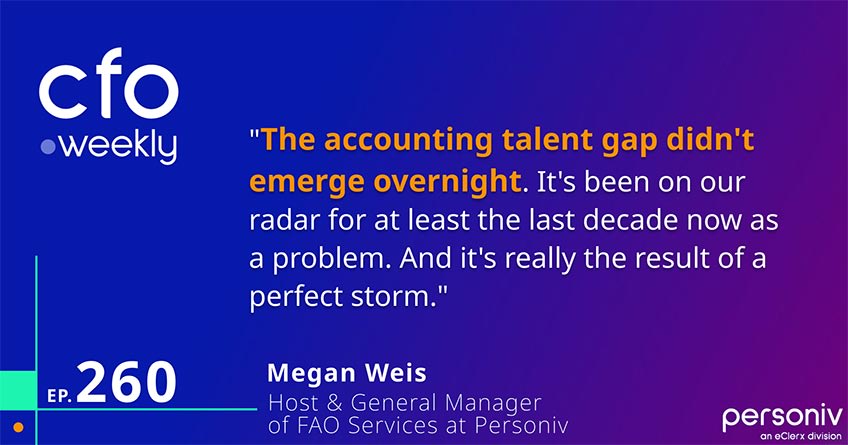
"The accounting talent gap didn't emerge overnight. It's been on our radar for at least the last decade now as a problem. And it's really the result of a perfect storm." Weis highlighted. - 00:07:53 - 00:09:41
Integrated Finance Technology Strategies for CFOs
Leading CFOs are combining AI, automation, and outsourcing to create 24/7 coverage, reduce manual work by 30-50%, and enable finance teams to focus on strategic analysis rather than transactional processing.
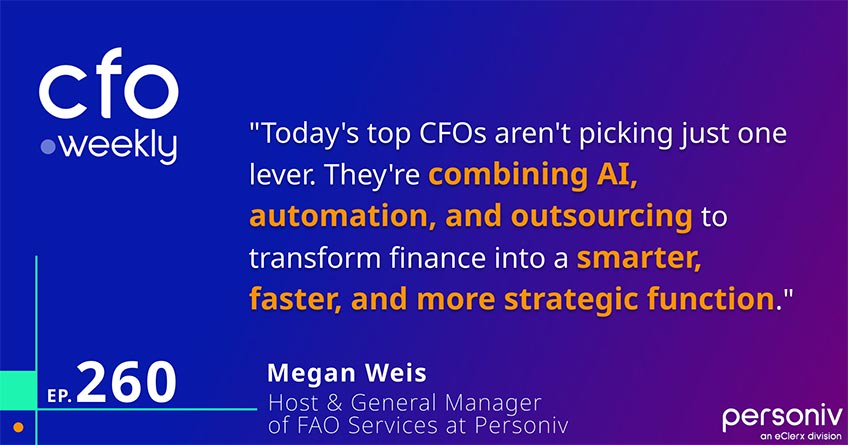
"Today's top CFOs aren't picking just one lever. They're combining AI, automation, and outsourcing to transform finance into a smarter, faster, and more strategic function." Weis commented. - 00:10:05 - 00:12:12
Finance Outsourcing: The Solution to Extended Hiring Timelines for CFOs
Open finance roles now take 90-120 days or longer to fill, creating operational risks, team burnout, and strategic delays that force CFOs to rethink workforce planning and retention strategies.
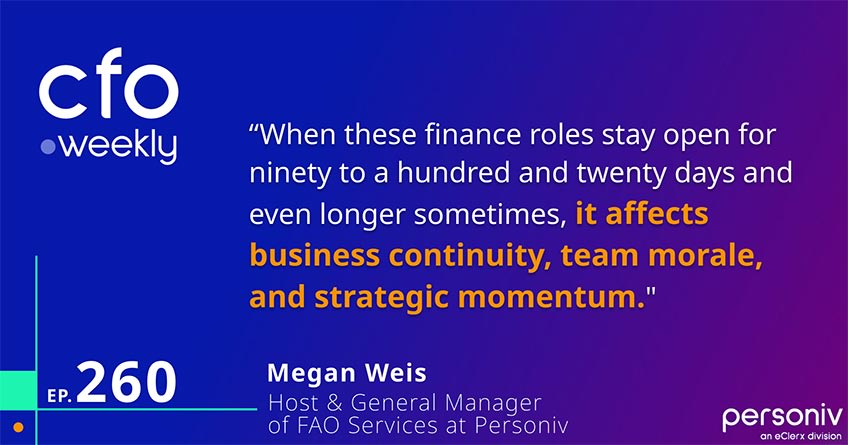
“When these finance roles stay open for ninety to a hundred and twenty days and even longer sometimes, it affects business continuity, team morale, and strategic momentum." Weis mentioned. - 00:15:39 - 00:18:25
Evolution of CFO Role
The modern CFO has transformed from financial steward to strategic partner, technology leader, risk champion, people builder, and communicator-in-chief who drives growth, resilience, and value creation.
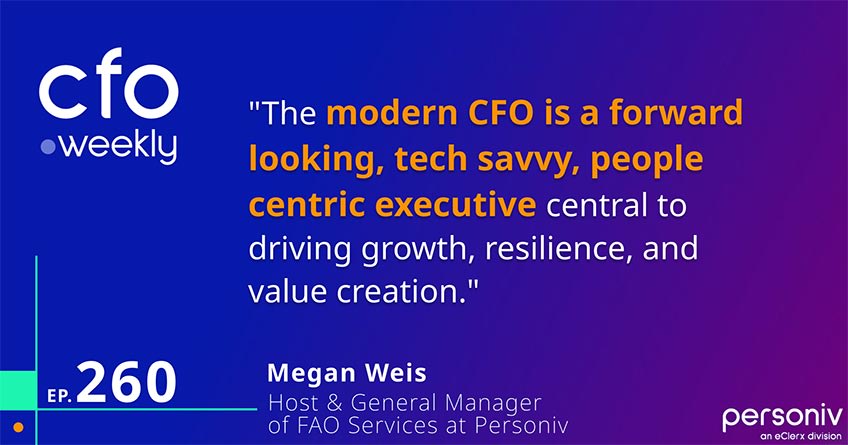
"The modern CFO is a forward looking, tech savvy, people centric executive central to driving growth, resilience, and value creation." Weis remarked. - 00:21:45 - 00:23:32
Gen Z Workforce Engagement Strategies for CFOs
Gen Z professionals require purpose-driven work, technological fluency, flexibility beyond remote work, personalized career growth, and cultures of belonging rather than traditional perks like foosball tables and casual Fridays.
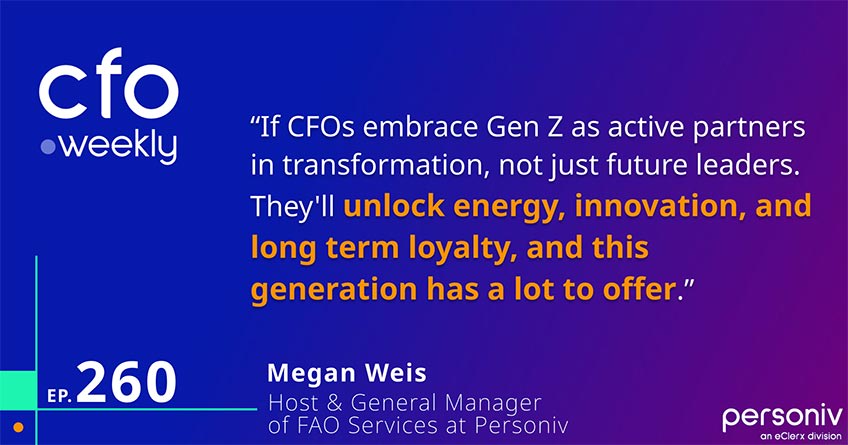
As Weis said, "Gen Z isn't just the future of workforce. They're already here, and they're reshaping what they expect from employers... They're purpose driven. They're digitally fluent. They value flexibility, autonomy, and having impact." - 00:25:09 - 00:26:39
For more interviews from the CFO Weekly podcast, check us out on Apple Podcasts, Spotify, and our RSS or your favorite podcast player!
Instructions on how to follow, rate, and review CFO-Weekly are here.
Elevate your business with a future-ready finance team! We deliver premier financial and accounting solutions tailored to help CFOs drive strategic growth and confidence. Drop us a line today to learn more.



















